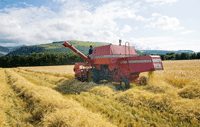Barley: the naked truth

There’s potentially a huge market for naked barley in the UK, but plant breeders must first develop varieties suited to our conditions, says Sarah Henly
Many are already familiar with naked varieties of oat, but UK growers could be commercially growing a naked version of barley within the next five years, tapping into the high-value health food market.
Naked or hulless barley, grown in Asia for thousands of years, promises to open doors for UK growers already familiar with hulled barley, according to Edward Dickin of Harper Adams University College, formerly at Bangor University. All we need is a little investment in developing naked barley varieties and markets.
All current UK barley varieties are of the covered type, where the pales (outer covers of the flowers) are tightly cemented to the grain and must be removed by pearling to render them edible for humans. That process removes the nutritious bran and germ, explains Dr Dickin.
Naked barley grains thresh freely from the pales so the whole grain can be used with the soluble fibre, beta-glucan, intact.
“There’s no doubt about the health benefits of beta-glucan rich foods. And we have confirmed that current naked barley varieties are easier to process and contain as much soluble fibre as oats, with the potential for more. Oats are already labelled as cholesterol controlling.”
Consumer demand is expected to rise. Tests using barley porridge at Imperial College London suggest dietary intervention with barley beta-glucan could help prevent type 2 diabetes, with resultant cost savings to the NHS. However, the plant breeding industry would need to buy in.
Naked types were thought to be common in this country in the Bronze Age, but the gene was eliminated from European barley by selective breeding for malting. The project has confirmed the naked trait is relatively easy to re-introduce into modern types as it is a single gene effect.
Exotic types available in the Far East, and European varieties such as Lawina, perform well in baking tests, but they yield poorly in the UK. They are prone to mildew and lodging, and often don’t establish well, Dr Dickin warns.
But in trials, the team at Bangor has overcome most of the agronomic problems associated with naked barley. To counteract poorer establishment, Dr Dickin suggests developing winter varieties that have greater potential for compensatory tillering. He is hopeful that, within five to 10 years, we could have a valuable new crop in the UK, supplying up to 30% of loaf volume currently supplied by wheat.
“Barley uses less water and requires less fertiliser than wheat, and we are confident yields can be enhanced. Currently, naked spring types produce half the yield of the variety Tipple, but we can expect 80-85%, which could be offset by a higher premium.”
He believes the levy contribution to this work, a mere £25,000 of the total £112,000 – the remainder made up by the Welsh Assembly through the Supply Chain Efficiencies Scheme – is money well spent. But there’s a vicious circle to overcome before anyone is willing to invest. Plant breeders want a proven market, and food processors want to secure a substantial supply at a fair price.
Welsh processor, Pobty Cae Groes and others, has been happy with the test batches produced during the project, but need a robust supply chain to go any further. So naked barley must now break out of the niche crop mould as it has in more exotic parts of the world.
HGCA Perspective
• Barley is potentially a nutritious food high in beta-glucan, useful in ameliorating diet-related health problems such as obesity, type 2 diabetes and high cholesterol
• De-husking (pearling) decreases nutritional value so using naked barley is answer
• Need varieties adapted to UK conditions
• Develop crop to supply potential new market for baked products
Final report for project available on the HGCA website: www.hgca.com/research
Crops perspective
Naked barley could supply the developing dietary health requirement for foods rich in beta-glucan and with a low glycaemic index. UK growers stand to benefit if they have the support of plant breeders and processors. We need to invest now in developing new varieties and new food products with health-related labelling.
Summary
Project no 3229: To exploit naked (hulless) barley for functional food; Bangor University, Welsh Assembly Government (WAG); from April 2008 to April 2010.

